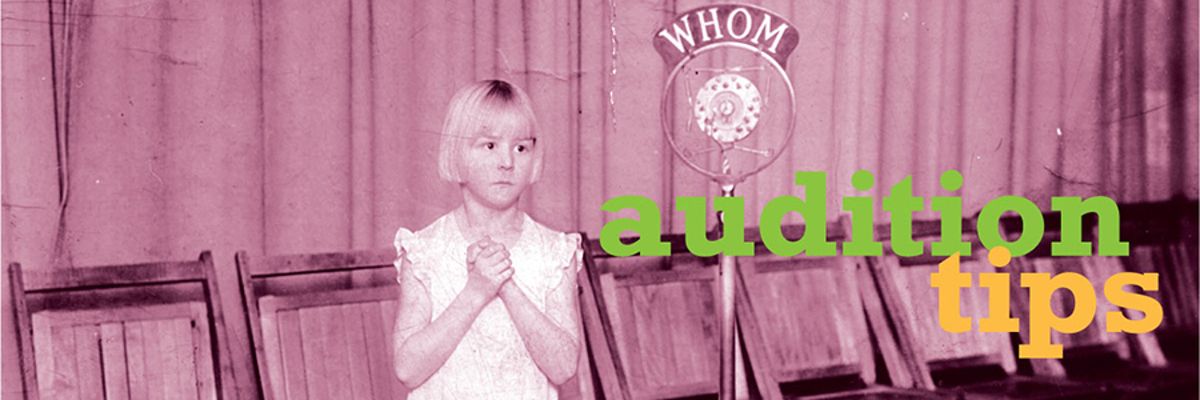Audition Tips

People frequently ask for help on how to audition. Here's my advice:
First things first!
ALWAYS AUDITION. The advantages to auditioning are many: you get to see us and we to see you. You get to demystify the audition process. You have nothing to lose and everything to gain (worst case scenario: you don't get cast and are no worse than before; best case scenario: you get cast!)
Tips and Tricks and things to bear in mind:
- We are looking mostly for the individual personality you bring to a role, not technical or "acting" expertise necessarily (certainly in initial auditions).
- Choose something (a monologue/poem/something that you can prepare) that you feel will cater to your strengths (both as an actor and as a human being). There are monologue books, plays you can skim through and search for blocks of text if you're looking to find a monologue. If all that eludes you prepare something! Anything!
- Preparation means memorization! We really need to see you without your face buried in your phone or a sheet of paper...so if it's at all possible to memorize what you're preparing (and memorize it well so you feel secure in it), do that.
- Preparation means interpretation! Have a point of view on what you're trying to show us with your audition piece. Show us you feel passionately about the words you're saying and that you've thought about them. Show us something with energy, vitality, and boldness.
- Preparation means communication! Make sure you don't just read or recite what you prepare. Communicate the thing you're performing to the folks who are in the audition room. Connect with them!
- Be as "honest" as possible: try to imaginatively enter into the words and situation of the character you're playing...don't "fake" emotion; try to be as "real" in the expressing of emotion as possible.
- Find humor and variation in what you do (even if it's not a "funny" piece).
- Don't be too rigid in how you do your monologue: we may ask you to change how you do something, so try go with those changes; don't cling to your initial approach to the monologue (we're trying to see how you deal with taking direction and how much you can change).
- Don't be afraid! (It's normal--and good--to be nervous.) And don't be afraid of failing, messing up, needing to start again, or forgetting your words (etc.). Throw yourself into your monologue 100% and don't worry about what anyone (including those who are auditioning you!) think of you and your performance.
- Short is good! A monologue (or audition piece) should be 1-2 minutes long. Longer doesn't mean better.
Finally: a Dirty Little Secret!
The truth is, most students barely prepare for auditions. Perhaps they read their piece a few times and perhaps they (shakily) memorize it. So, if you really prepare, you make a huge impression at the start which puts you almost immediately at the front of the line. I cannot stress how really putting effort into preparing well pays off. But it does!
How to choose a monologue?
This is probably the most asked question and the most fretted-over concern folks have about auditioning. There are a few ways to do this (and a few hints, too):
- Find a book of monologues (plenty abound online and in the library) and choose one that you like. The good part of this is the ease of finding something. The bad part of this is that many of these monologues are written just for these anthologies, so they're often not very well written and give you very little sense, if any, of what the character you're playing might actually be like. So, it's mostly pretty poor material.
- Wander through the stacks of plays (they're all roughly in the same area) in the library (yes, libraries are still real, non-digital environments, as are published plays!) Find significant playwrights and skim through their plays looking for largish chunks of text. See if any of those chunks appeal. The good part of this is that you're generally dealing with better material, and you can read the whole play so you will have context and information on which to base your character and the situation in which the monologue exists dramatically. The Bad? It takes more legwork and more time to do this. (The upside is that once you've found a decent monologue you love, you can re-use it in audition after audition...if you want). You can do this with the libretti/books of musicals too (they're usually in the Art & Music Library and not the main Rush Rhees stacks)
- Still lost? Find a poem or take some text from a movie screenplay and prepare that. If you choose a poem, make sure it's one with a strong "voice" so it can read like a monologue. Movie extracts tend to be not so good...but if that's what spurs you to action, go for it.
- Write your own monologue. Generally, I would discourage this, but if you must....
- Here are some (American) playwrights in whose work you might look at to find monologues (there are many many more): Arthur Miller, Tennessee Williams, David Mamet, Edward Albee, Sam Shepard, Wendy Wasserstein, Lanford Wilson, Tony Kushner, Suzan-Lori Parks, Jose Rivera, Paul Rudnick, Christopher Durang, August Wilson, Maria Irene Fornes, Adrienne Kennedy, Eve Ensler, Clair Barron, Annie Baker, Lucas Hnath, Jackie Sibblies Drury...
- What about Shakespeare? I would guard against using Shakespeare, unless you're specifically auditioning for a Shakespearean play. That being said, if you feel that's your strength, and that you can make it live in a contemporary way, go for it...
- Got ambition? You probably want to have 3 good monologues on hand: a serious one, a comic one , and a Shakespearean one.
